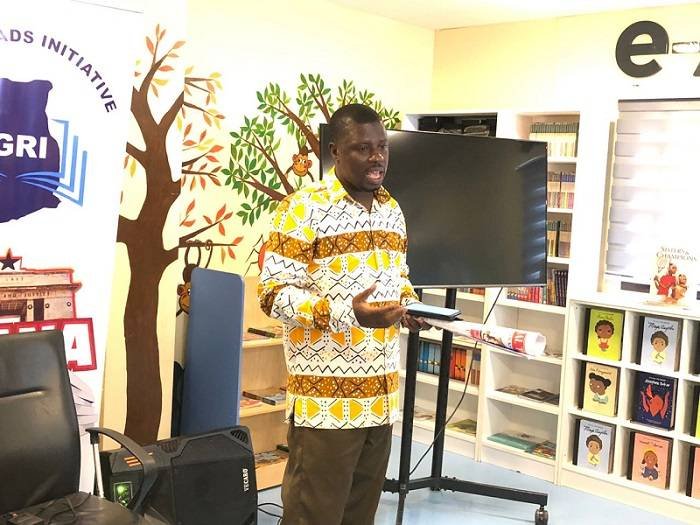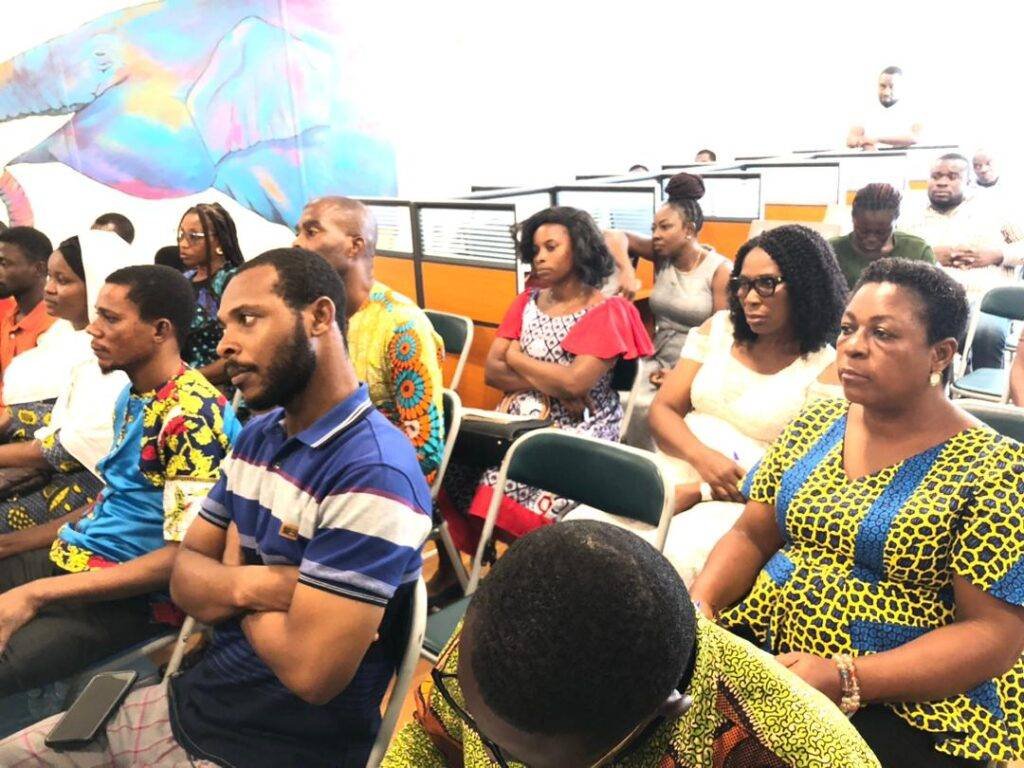News
Ghana Reads Initiative, Adwinsa Publications collaborate to mark Intern’l Literacy Day

Mr Kwaku Oppong Amponsah adressing the congregation
The Ghana Reads Initiative in collaboration with Adwinsa Publications marked this year’s International Literacy Day with focus on supporting persons with special needs.
The event held at E-Ananse, a library in Accra, brought together teachers, students, writers and other stakeholders in education to share ideas to promote literacy and inclusivity within Ghana’s education system.
Speaking at the event, the Secretary-General of the Pan African Writers Association (PAWA), Mr Wale Okediran said it was important to support children with disabilities to be able to make progress in education.
“Our unwavering commitment lies in providing children with disabilities with education and quality life free from discrimination within their communities,” he stated.
He said, it was crucial to provide essential support systems to ensure these children were not intimidated.
The Chief Executive Officer (CEO) of Adwinsa Publications, Mr Kwaku Oppong Amponsah, expressed concern about the unfortunate maltreatment sometimes endured by children with special needs at the hands of their teachers.
Mr Amponsah called for an end to such discrimination, highlighting that those children constituted an integral part of the educational ecosystem.
There was a special presentation by Mrs Belinda Bukari, from the Special Education Division, of the Ghana Education Service (GES), focusing on the identification, referral and appropriate placement of children with special needs within the education set-up.
Mrs Bukari urged teachers to avoid discriminatory practices but rather, should actively involve children with special needs in their educational processes.
She urged educators to adopt the ‘ABC’ method; Appearance, Behaviour, Complaints as means to identify potential issues and promptly guide students towards the necessary support structures.
She stated that students with special educational needs must not be marginalised by educational policies, emphasising the need to formulate inclusive strategies within the educational framework.
Mr Kwesi Koomson expressed his appreciation to the Ghana Reads Initiative and Adwinsa Publications for their role in ensuring the programme’s success.
He said, with the synergy between the two bodies, there was prospect for positive transformation assisting children with special needs in the country.
By George Obeng Osei
News
Prioritise affordable treatment of sickle cell treatment —Health Expert

Health experts have urged Ghana to prioritise affordable and accessible treatment for sickle cell disease (SCD) as advanced, but costly curative therapies remain out of reach.
SCD, an inherited blood disorder, affects about three in every 100 newborns in Ghana.
Globally, around 1,000 babies are born with the condition daily, with three-quarters in sub-Saharan Africa.
The disease causes severe complications including chronic pain, anaemia, infections, strokes and organ damage, often leading to shortened life expectancy.
In recent years, gene therapy has been developed as a potential cure.
However, its cost—running into millions of dollars per patient—makes it financially and technically inaccessible in Ghana.
According to Dr Lawrence Osei-Tutu, a Sickle Cell and Childhood Cancer Expert at the Komfo Anokye Teaching Hospital, “the country must instead focus on practical, lower-cost interventions such as hydroxyurea”, a decades-old cancer drug proven to reduce painful episodes, hospitalisation and life- threatening complications in SCD patients”.
Taken orally, the medicine improves red blood cell function and is considered safe and effective.
“Hydroxyurea therapy is as good as the cure and a low-hanging fruit to pluck, we must bring a cure to our sickle cell warriors, but do so sustainably.” he urged.
In a chat with The Spectator here, he said to create awareness on the disease, the expert noted that despite its benefits, “hydroxyurea is not widely accessible in Ghana.”
Stressing that, “many patients either cannot afford it or struggle with irregular supply through the health system.”
Moreover, he argued that scaling up access would provide immediate relief while the country builds the infrastructure, trains specialists and secures funding needed to support curative therapies in the future.
With an estimated 15,000 babies born with sickle cell disease annually in Ghana, Dr Osei Tutu cautioned that “failure to improve access to effective treatment will leave many patients vulnerable to preventable complications and early death.”
From Kingsley E. Hope, Kumasi
Join our WhatsApp Channel now!
https://whatsapp.com/channel/0029VbBElzjInlqHhl1aTU27
Hot!
Let’s reintroduce Cultural Studies to complement educational reforms — Tourism Minister

Madam Abla Dzifa Gomashie, the Minister of Tourism, Culture and Creative Arts, has emphasised the importance of reintroducing Cultural Studies in schools as part of Ghana’s broader educational reform agenda.
She said Cultural Studies would complement existing efforts to reposition Science, Technology, Engineering and Mathematics (STEM) and Technical Vocational Education and Training (TVET) to promote digital literacy and expand Creative Arts education.
Speaking at the 2025 Homowo Festival of the people of Ningo-Prampram, held on the theme: “Education: The Best Legacy for our Children,” Madam Gomashie said cultural education was critical to national identity and development.
She noted that the festival’s theme aligned with the Government’s vision to transform education in Ghana and encouraged the youth to embrace it not only as a means of personal development but also as a way of preserving traditional values.
These values, including patience, wisdom, and hard work, were at the core of the Homowo celebration, the Minister said.
“Cultural festivals like Homowo are vital instruments for strengthening cultural identity, preserving historical memory, and fostering national unity. Additionally, festivals serve as platforms for educating the youth through storytelling, music, dance, and other traditional practices, while also providing opportunities for community engagement.”
Madam Gomashie highlighted the strong foundation that Ghana’s tourism was built on, which included culture, traditions, and the creative industry, collectively contributing to over GH¢4.8 billion to the economy.
“Festivals give tourists reasons to visit our country. Therefore, with the right infrastructure and the development of all the domains, the sector can do more than what has been recorded,” she added.
Mr Sam Nartey George, the Member of Parliament for Ningo-Prampram and Minister of Communication, Digital Technology and Innovation, commended the community for their vibrant participation in the festival. He announced plans for the construction of a new nursing training school in Ningo, aimed at expanding access to healthcare education in the area.
Nene Osroagbo Djangmah XII, Paramount Chief of Great Ningo Traditional Area; King Dr Tackie Teiko Tsuru II, Ga Mantse; Nene Tetteh Wakah III, Paramount Chief of the Prampram Traditional Area; Prof. Odaifio Welentsi III, Paramount Chief of the Nungua Traditional Area; Naana Dugbakuwor Dugba II, Paramount Queen Mother of Great Ningo; and Mr. Elvis Afriyie Ankrah, Special Envoy on Religion and Inter-Faith Affairs, who represented the Chief of Staff, were among dignitaries at the festival. -GNA






